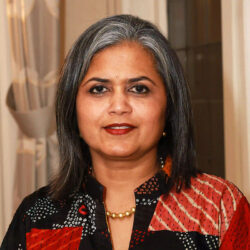India’s 2024 General Election: What to Know
May 29th, 2024 11:30AM -12:30PM
India has successfully maintained its electoral democracy for over 75 years, despite facing frequent political upheavals in the region. The world’s biggest election and largest-ever democratic exercise with 969 million eligible voters and more than 2,600 political parties started on April 9th and the results are set to be announced on June 4th.
Join us of for a conversation with Dr. Milan Vaishnav and Professor Sital Kalantry as we discuss India’s election outcomes and its implication for India and the world.
Our Speakers:
 Milan Vaishnav is a senior fellow and director of the South Asia Program and the host of the Grand Tamasha podcast at the Carnegie Endowment for International Peace. His primary research focus is the political economy of India, and he examines issues such as corruption and governance, state capacity, distributive politics, and electoral behavior. He also conducts research on the Indian diaspora.
Milan Vaishnav is a senior fellow and director of the South Asia Program and the host of the Grand Tamasha podcast at the Carnegie Endowment for International Peace. His primary research focus is the political economy of India, and he examines issues such as corruption and governance, state capacity, distributive politics, and electoral behavior. He also conducts research on the Indian diaspora.
He is the author of When Crime Pays: Money and Muscle in Indian Politics (Yale University Press and HarperCollins India, 2017), which was awarded the Kamaladevi Chattopadhyay New India Foundation book prize for the best non-fiction book on contemporary India published in 2017. He is also co-editor (with Devesh Kapur) of Costs of Democracy: Political Finance in India (Oxford University Press, 2018) and (with Pratap Bhanu Mehta and Devesh Kapur) of Rethinking Public Institutions in India (Oxford University Press, 2017). His work has been published in scholarly journals such as American Journal of Political Science, Asian Survey, Governance, India Review, Journal of Democracy, Perspectives on Politics, PS: Political Science and Politics, and Studies in Indian Politics. He is a regular contributor to several Indian publications.
Previously, he worked at the Center for Global Development, where he served as a postdoctoral research fellow, the Center for Strategic and International Studies, and the Council on Foreign Relations. He is an adjunct professor in the Edmund A. Walsh School of Foreign Service at Georgetown University (currently on leave) and has previously taught at Columbia and George Washington Universities. He holds a Ph.D. in political science from Columbia University.
 Professor Sital Kalantry is a tenured professor, associate dean, and founder of the India Center. She is an expert in comparative law, business and human rights, feminist legal theory, and contract law. Her latest book, Court on Trial, published by Penguin Press, uses originally developed data to improve transparency and the function of the court. Her prior book, Women’s Rights and Migration, explores the consequences of the use of acontextual information to develop laws relating to reproduction in the United States. She has written over a dozen articles and book chapters that have been published in major legal journals such as the Cornell Law Review and the Stanford International Law Journal as well as peer-reviewed social sciences journals including the Forum for Health Economics and Policy. Her work has also appeared in the New York Times, Slate, and the Hill (among others). She is a regular media commentator on reproductive rights, law in India, and human rights issues. Her writing has been cited by the U.S. Supreme Court and Indian Supreme Court.
Professor Sital Kalantry is a tenured professor, associate dean, and founder of the India Center. She is an expert in comparative law, business and human rights, feminist legal theory, and contract law. Her latest book, Court on Trial, published by Penguin Press, uses originally developed data to improve transparency and the function of the court. Her prior book, Women’s Rights and Migration, explores the consequences of the use of acontextual information to develop laws relating to reproduction in the United States. She has written over a dozen articles and book chapters that have been published in major legal journals such as the Cornell Law Review and the Stanford International Law Journal as well as peer-reviewed social sciences journals including the Forum for Health Economics and Policy. Her work has also appeared in the New York Times, Slate, and the Hill (among others). She is a regular media commentator on reproductive rights, law in India, and human rights issues. Her writing has been cited by the U.S. Supreme Court and Indian Supreme Court.
Professor Kalantry teaches business and human rights, comparative constitutional law, and contract law. Her teaching is informed by her scholarship as well as her seven years of experience as a corporate lawyer at two major U.S. law firms, Milbank and O’Melveny & Myers, and by her litigation experience in international and foreign courts, including the Indian Supreme Court, Inter-American Court of Human Rights and Constitutional Court of Colombia.
She founded the Cornell International Human Rights Clinic, the University of Chicago International Human Rights Clinic, the Avon Global Center for Women & Justice at Cornell Law School, the Cornell India Law Center, and the India Center for Law and Justice at Seattle University School of Law. She is the founding faculty director of an online Master’s in Legal Studies Program at Cornell Law School. In that role, she designed the curriculum, recruited tenured and adjunct professors to teach courses, created admissions criteria, and coordinated with instructional designers and other administrators for this new master's program at Cornell Law School.
She has won awards for her book, for her public interest work (from the South Asian Bar Association), and for her mentorship and support to women students at Cornell University. She has received several grants, including a $1.5 million grant to start the Avon Center for Women and Justice, a grant from NYC Visioning Committee, and teaching innovation grant. She received the Fulbright Scholarship to teach at Jindal Global Law School in India and to conduct empirical research on the Indian Supreme Court.
Professor Kalantry has degrees from Cornell University (A.B.), the London School of Economics (MsC), and the University of Pennsylvania Carey Law School (J.D).
In Partnership with RoundGlass India Center:
